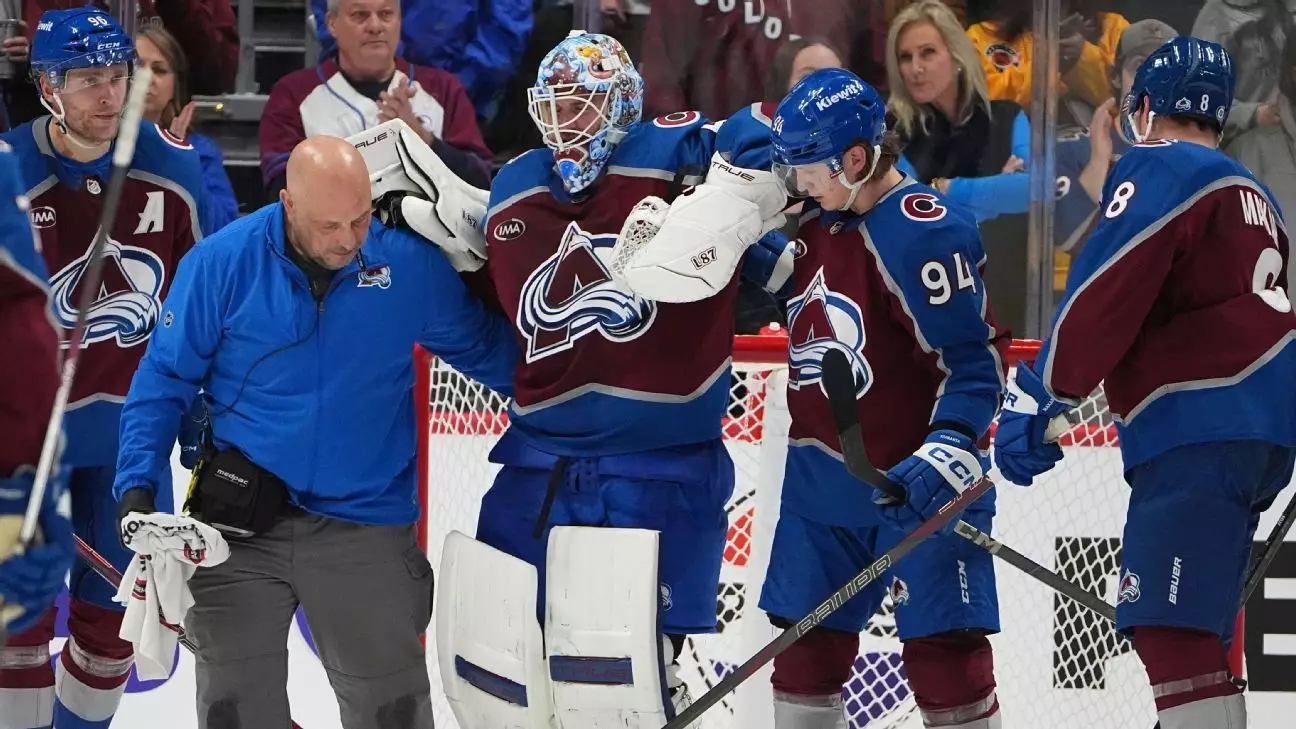The thrilling atmosphere of a hockey game often masks the tension that simmers beneath the surface. This was particularly evident during a recent match featuring the Colorado Avalanche and the Buffalo Sabres. Although the Avalanche celebrated a stunning comeback victory, the post-game atmosphere was marred by the intense frustration of their coach, Jared Bednar. His ire was directed at the officiating crew, specifically regarding a crucial incident involving goaltender Scott Wedgewood.
In professional sports, player safety is paramount. What exacerbated Bednar’s frustration was that during the third period, the officials failed to act when Wedgewood was knocked down and appeared to be injured. The Avalanche coach articulated his disbelief, emphasizing the need for immediate intervention in scenarios that could jeopardize player welfare. “If he’s hurt and he’s not getting up… the whistle should go,” he stated firmly, highlighting the importance of safeguarding athletes on the ice. Despite his team’s eventual triumph, Bednar’s unresolved tension spotlighted a significant issue regarding officiating protocol within the league.
The incident unfolded during a critical moment in the game. Sabres forward Zach Benson collided with Wedgewood after being pushed by Parker Kelly. This collision not only posed a risk to the goaltender but became a pivotal moment in the game when Benson recovered, regained control of the puck, and scored. The lack of a stoppage in play drew immediate scrutiny, particularly from Bednar, who argued that the officials overlooked the obvious signs of injury. His post-game comments reflected a deep-seated concern for the player’s well-being, as well as highlighting inconsistencies in how officials enforce the rules regarding player safety.
Adding fuel to the fire, Bednar chose to challenge the goal, knowing full well that the chances of overturning the call were slim. This decision was rooted in his desire to urge the officials to reevaluate their approach to player safety. As he articulated, “It gives them another chance to do the right thing.” However, despite his challenge, the call stood, culminating in Wedgewood being sidelined and later confirmed to miss time due to the injury sustained during the play.
This incident raises important questions about how player safety is prioritized within the framework of officiating. The tension underscores a larger inconsistency that many teams and coaches have observed over the years, where the rules surrounding injuries and stoppages in play aren’t always uniformly applied. Symptoms of injury should trigger immediate action from the officiating crew, yet this is often overlooked, leading to controversial moments that threaten player safety.
Post-match, Bednar articulated plans to reach out to league officials, indicating that dialogue is vital for progress on this front. His frustration was not just about one call or one game; it encapsulated a call for systemic change in how player safety is enforced within the NHL. He stated, “After this presser, I’m sure I’ll get a call from the league,” a comment that hinted at the anticipated backlash he was prepared to face for challenging the status quo.
Despite the angst surrounding Wedgewood’s injury, the incident acted as a rallying point for the Avalanche. The team showcased remarkable tenacity by overcoming a three-goal deficit, with Jonathan Drouin’s timely equalizer and Devon Toews’ thrilling overtime winner. Toews reflected on the emotional weight of the incident, acknowledging that the players felt motivated to perform not just for victory but in solidarity for their injured teammate.
A single moment during a hockey game can resonate far beyond the scoreboard. The reactions from Bednar illuminate a broader dialogue regarding officiating practices, player safety, and the inevitable emotional landscape of professional sports. The Avalanche may have secured a significant win, but the lingering questions about player safety and goalkeeping standards will certainly continue to echo in the corridors of the NHL. Moving forward, it is essential that the league examines such incidents to uphold not only the integrity of the game but also the well-being of its players.

